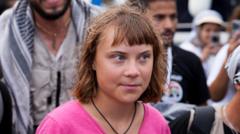Did Greta Thunberg's Gaza Flotilla Just Arrive in Tunisia?

Published: 2025-09-07 21:00:22 | Category: world
On Sunday, large crowds gathered at Tunisia's Sidi Bou Said port to welcome Greta Thunberg and her flotilla of pro-Palestinian activists, who aim to deliver vital aid to Gaza. This mission underscores the ongoing humanitarian crisis in the region, amplifying calls for action amidst controversy surrounding aid access and allegations of genocide.
Last updated: 16 October 2023 (BST)
Key Takeaways
- Greta Thunberg's flotilla includes 350 activists and aims to deliver aid to Gaza.
- The mission is part of a larger protest against Israel's blockade and ongoing humanitarian crisis.
- Previous attempts to reach Gaza have faced interception by Israeli forces.
- UN reports indicate famine conditions in Gaza, attributed to Israeli actions.
- Thunberg's efforts have sparked significant public and political reactions across Europe.
Thunberg's Arrival and the Mission's Objectives
Greta Thunberg, the renowned Swedish climate activist, has shifted her focus to humanitarian issues, particularly the plight of Palestinians in Gaza. Her recent arrival in Tunisia marks a pivotal moment in her campaign for humanitarian aid. Thunberg is accompanied by 350 activists, all part of a flotilla that aims to deliver essential supplies to those affected by the ongoing conflict.
The flotilla's mission is not merely about delivering aid; it seeks to challenge what activists describe as an "illegal siege" imposed by Israel. The group, known as the Global Sumud Flotilla, intends to draw attention to the humanitarian crisis in Gaza, which has been exacerbated by the Israeli blockade. The flotilla began its journey from Barcelona, setting sail on Monday, and has now docked in Tunisia for logistical preparations.
The Humanitarian Crisis in Gaza
The crisis in Gaza is dire, with recent reports from the United Nations indicating that famine conditions exist in the territory. These findings have been met with resistance from Israeli officials, who attribute the humanitarian issues to Hamas and the inefficiencies of aid agencies. The UN's humanitarian chief has directly linked the famine to Israel's "systematic obstruction" of aid, highlighting a contentious and complex situation.
Israel has consistently denied allegations of starvation, asserting that any shortages are due to Hamas's actions. This narrative contrasts sharply with reports from humanitarian organisations and activists who argue that the blockade severely limits access to essential goods, including food, medicine, and clean water.
International Reactions and Political Implications
The response to Thunberg's mission has been mixed, reflecting broader geopolitical tensions. Many view her actions as a courageous stand for human rights, while others dismiss them as mere publicity stunts. For instance, Israeli authorities have characterised previous attempts to deliver aid as ineffective, arguing that they do not contribute to meaningful humanitarian relief.
In her address at the port, Thunberg emphasised the urgency of the situation, stating, "We all know why we are here. Just across the water, there's a genocide going on, a mass starvation by Israel's murder machine." Such statements have sparked intense debate and further polarised opinions regarding the conflict.
The Role of Activism in Humanitarian Aid
Activism has become an increasingly vital component of humanitarian aid efforts, particularly in politically charged environments like Gaza. The Global Sumud Flotilla is emblematic of how grassroots movements can mobilise support and raise awareness about humanitarian crises. Activists believe that their presence can pressure governments and international organisations to take more decisive action.
Rima Hassan, a French-Palestinian Member of the European Parliament, echoed this sentiment at the port, stating, "The Palestinian cause is not in the hands of governments today. It is in the hearts of peoples everywhere." This highlights a shift in how humanitarian efforts are being framed, focusing on solidarity and civilian action rather than solely relying on official channels.
Previous Attempts and Challenges Faced
The journey to Gaza has not been without its challenges. A previous flotilla attempt in June was intercepted by Israeli forces, raising concerns about the safety and legitimacy of these missions. Organisers have expressed determination to navigate these obstacles, but the risks involved are considerable.
Activists participating in the current flotilla have acknowledged the dangers but remain resolute in their mission. Their strategy involves not only delivering aid but also raising awareness through media coverage and public engagement. The flotilla will remain in Tunisia for a few days to gather additional supplies before attempting to reach Gaza.
What Lies Ahead for the Flotilla
As the flotilla prepares for its next leg to Gaza, the situation remains fluid. Activists are hopeful that increased international scrutiny will facilitate their mission, although tensions with Israeli authorities are likely to remain high. The flotilla's success will depend not only on logistical planning but also on the broader political landscape.
With the potential for increased media coverage, the flotilla aims to amplify its message and garner support from the international community. The hope is that this mission will not only deliver much-needed aid but also spark conversations about human rights and the responsibilities of governments in conflict zones.
Conclusion
Greta Thunberg's involvement in the flotilla represents a growing intersection of climate activism and humanitarian concerns. As tensions in Gaza continue to escalate, the plight of the Palestinian people remains a pressing issue that demands attention and action. The journey ahead for the flotilla is fraught with challenges, yet it underscores the power of collective mobilization in advocating for human rights.
How will the international community respond to the ongoing humanitarian crisis in Gaza? The outcome of this flotilla may influence future activism and aid efforts. #GazaFlotilla #HumanRights #GretaThunberg
FAQs
What is the purpose of Greta Thunberg's flotilla?
The flotilla aims to deliver humanitarian aid to Gaza and raise awareness about the ongoing crisis, which activists claim is exacerbated by Israel's blockade.
Why is there a humanitarian crisis in Gaza?
The crisis is attributed to a blockade by Israel, which restricts access to essential goods. Recent UN reports indicate famine conditions due to these restrictions.
What were the results of previous flotilla attempts?
Previous flotilla attempts have faced significant challenges, including interception by Israeli forces, which raises concerns about the safety and effectiveness of such missions.
What is the role of activism in humanitarian aid?
Activism plays a crucial role in raising awareness about humanitarian crises, mobilising support, and pressuring governments to take action on issues like those in Gaza.
How has the international community reacted to Thunberg's mission?
Reactions have been mixed; while some praise her efforts as a stand for human rights, others dismiss them as publicity stunts lacking substantial impact.



